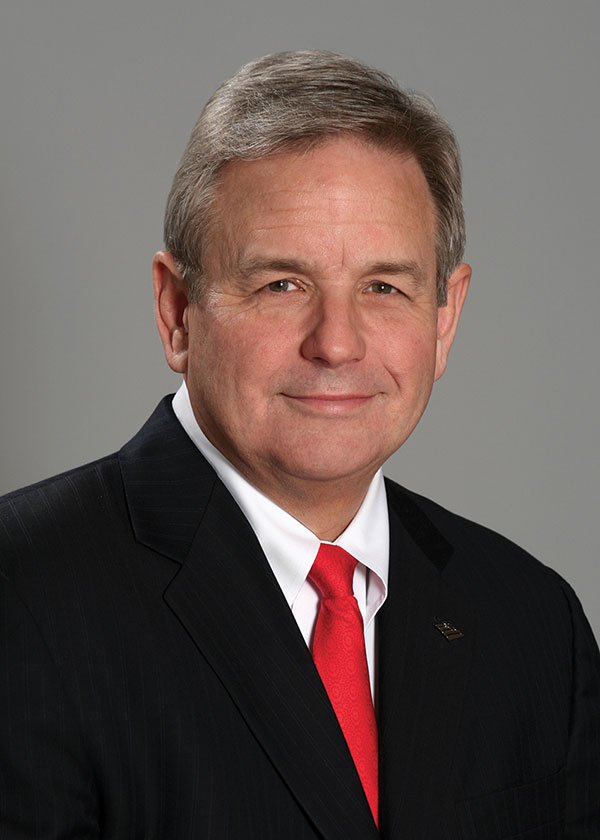Chad Holliday (’70, ENG) didn’t know he’d be at the forefront of a revolution, but he is grateful that he was.
As chairman and CEO for DuPont, Holliday shepherded a bold move that charted the course of greener business practices around the world.
In the 1980s, refrigerators and air conditioners were happily humming along, making people and industries accustomed to keeping things cool when they so desired. Pulsing through the veins of these devices was a cooling agent called Freon, produced by DuPont. It was heavily speculated that Freon, and other chlorofluorocarbons (CFCs) like it, were playing a key role in something else—depleting the earth’s ozone layer.
During this time, DuPont put Freon on ice, making it the first company to phase out the selling of CFC products.
“I remember the day our company made a bold move and we were so proud,” says Holliday. “But then, the customers called.”
Holliday managed marketing for Freon and had the unenviable job of explaining to customers that the product they were so dependent upon would no longer be available. Moreover, he had to convince them that using an environmentally friendly product would be good for everyone. However, at the time DuPont had no replacement ready for use.

Charles Holliday
“Customers started asking questions, and we had no answers for them that were reassuring. And we were trying to stop them from going to competitors,” says Holliday.
DuPont set an ambitious goal of finding a greener replacement product within five years that would be available at capacity and work in existing equipment.
DuPont succeeded.
It started selling Suva, a hydrofluorocarbon (HFC), which worked similar to Freon but was better for the environment. During this time, chlorofluorocarbons were outlawed by federal regulatory agencies, giving DuPont a leg up on the competition.
DuPont’s bold move crystallized for Holliday and the company that taking care of business and taking care of the environment go hand in hand.
A Big Problem
During the 1980s, DuPont was the largest polluter in the United States even though it followed all the rules and regulations.
“What we had said was that we were the largest polluter in the country because we were the largest chemical company in the country,” says Holliday. “But we realized that just following regulations wasn’t good enough.”
Holliday spent more than thirty–five years at DuPont, a company famous for two centuries for its chemically based products. He began while as a student at UT, spending a summer working at DuPont’s polymers factory in Old Hickory, Tennessee, rising through the ranks to become chairman and CEO in 1999.
It was during his leadership that the company made a major transformation from a chemical company into science-based products and services, with a third of its products becoming biologically instead of chemically based.
To Holliday the transformation was essential.
“If you do the materials balance,” says Holliday, “you will see that the world is using resources two and a half times faster than they can be replenished naturally. Fair estimates show that before the end of the century, if we do not do something drastically different, we will have a big problem on our hands.”
A Leader is Born
This realization, along with knowing that solutions are possible, created a leader in sustainable business practices.
Just as with the Freon challenge, Holliday has continuously illustrated that “doing something drastically different” is not impossible.
Take, for instance, Bank of America, of which Holliday has served as chairman since 2010.
In 2007, the bank committed to a ten-year, $20 billion environmental initiative and was the first financial institution to commit publicly to greenhouse gas reduction targets through the Environmental Protection Agency’s former Climate Leaders program. By 2009, the year Holliday arrived, Bank of America became the first financial institution to exceed its targets—reducing emissions by 18 percent from 2004 to 2009, twice its original 9 percent reduction goal.
Today, the bank, which owns one of the most efficient and ecologically friendly buildings in the world, is making great strides toward achieving loftier goals of radical reductions in its energy and paper consumption, water usage, and greenhouse gas emissions by 2015. Meeting its ten-year, $20 billion commitment in just five years, the bank recently increased its goal to a ten-year $50 billion commitment to support businesses that address climate change, reduce demands on natural resources, and advance lower-carbon economic solutions.
“The technology is there for the world to make a change without having to take a step backwards,” says Holliday. “There are countless companies worldwide that illustrate how economic growth, ecological balance, and social progress work together.”
Energizing the World, Responsibly
Holliday now travels the globe illuminating these examples and fostering ideas for change as co-chair of the United Nations Secretary-General’s High-Level Group on Sustainable Energy for All. The group has the goal of bringing clean and efficient energy technology to the 1.3 billion people who have nothing at all while helping others transform existing infrastructure.
“When people don’t have electricity, that takes away their ability for basic human development and to receive an education,” he says. “In this situation they don’t focus on sustainability, they just want electricity now. So, we can’t just think about the environment. We must balance our actions with basic human needs.”
Energizing the world and empowering people in a responsible way are nothing short of daunting, but just as with Freon, it must be done.
So far, the UN group is on its way to achieving its goals. Since 2011, it has spurred seventy-seven countries, most of them developing, to “opt in” for efficient energy plans and attracted more than $50 billion of proposed energy investment.
As Holliday has shown, bold moves like this are what will solve the world’s biggest problem
